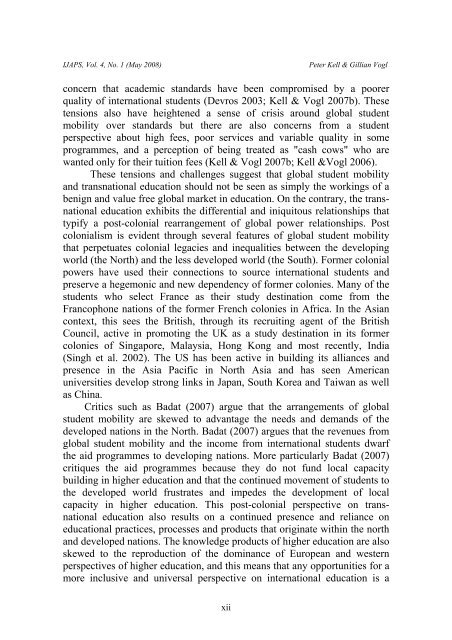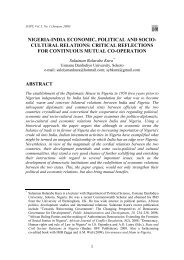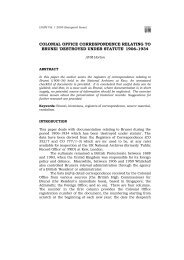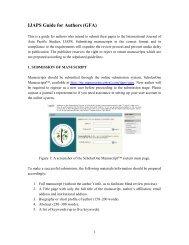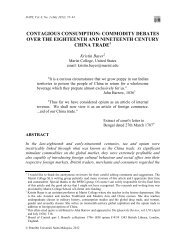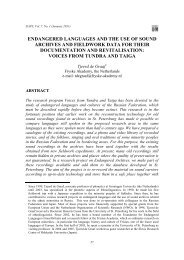This edition of the International Journal of Asia Pacific Studies ...
This edition of the International Journal of Asia Pacific Studies ...
This edition of the International Journal of Asia Pacific Studies ...
You also want an ePaper? Increase the reach of your titles
YUMPU automatically turns print PDFs into web optimized ePapers that Google loves.
IJAPS, Vol. 4, No. 1 (May 2008)Peter Kell & Gillian Voglconcern that academic standards have been compromised by a poorerquality <strong>of</strong> international students (Devros 2003; Kell & Vogl 2007b). Thesetensions also have heightened a sense <strong>of</strong> crisis around global studentmobility over standards but <strong>the</strong>re are also concerns from a studentperspective about high fees, poor services and variable quality in someprogrammes, and a perception <strong>of</strong> being treated as "cash cows" who arewanted only for <strong>the</strong>ir tuition fees (Kell & Vogl 2007b; Kell &Vogl 2006).These tensions and challenges suggest that global student mobilityand transnational education should not be seen as simply <strong>the</strong> workings <strong>of</strong> abenign and value free global market in education. On <strong>the</strong> contrary, <strong>the</strong> transnationaleducation exhibits <strong>the</strong> differential and iniquitous relationships thattypify a post-colonial rearrangement <strong>of</strong> global power relationships. Postcolonialism is evident through several features <strong>of</strong> global student mobilitythat perpetuates colonial legacies and inequalities between <strong>the</strong> developingworld (<strong>the</strong> North) and <strong>the</strong> less developed world (<strong>the</strong> South). Former colonialpowers have used <strong>the</strong>ir connections to source international students andpreserve a hegemonic and new dependency <strong>of</strong> former colonies. Many <strong>of</strong> <strong>the</strong>students who select France as <strong>the</strong>ir study destination come from <strong>the</strong>Francophone nations <strong>of</strong> <strong>the</strong> former French colonies in Africa. In <strong>the</strong> <strong>Asia</strong>ncontext, this sees <strong>the</strong> British, through its recruiting agent <strong>of</strong> <strong>the</strong> BritishCouncil, active in promoting <strong>the</strong> UK as a study destination in its formercolonies <strong>of</strong> Singapore, Malaysia, Hong Kong and most recently, India(Singh et al. 2002). The US has been active in building its alliances andpresence in <strong>the</strong> <strong>Asia</strong> <strong>Pacific</strong> in North <strong>Asia</strong> and has seen Americanuniversities develop strong links in Japan, South Korea and Taiwan as wellas China.Critics such as Badat (2007) argue that <strong>the</strong> arrangements <strong>of</strong> globalstudent mobility are skewed to advantage <strong>the</strong> needs and demands <strong>of</strong> <strong>the</strong>developed nations in <strong>the</strong> North. Badat (2007) argues that <strong>the</strong> revenues fromglobal student mobility and <strong>the</strong> income from international students dwarf<strong>the</strong> aid programmes to developing nations. More particularly Badat (2007)critiques <strong>the</strong> aid programmes because <strong>the</strong>y do not fund local capacitybuilding in higher education and that <strong>the</strong> continued movement <strong>of</strong> students to<strong>the</strong> developed world frustrates and impedes <strong>the</strong> development <strong>of</strong> localcapacity in higher education. <strong>This</strong> post-colonial perspective on transnationaleducation also results on a continued presence and reliance oneducational practices, processes and products that originate within <strong>the</strong> northand developed nations. The knowledge products <strong>of</strong> higher education are alsoskewed to <strong>the</strong> reproduction <strong>of</strong> <strong>the</strong> dominance <strong>of</strong> European and westernperspectives <strong>of</strong> higher education, and this means that any opportunities for amore inclusive and universal perspective on international education is axii


